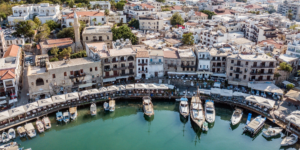If you’re heading to Northern Cyprus, managing your money is key. Here’s what you need to know:
- Currency: The Turkish Lira (₺) is the official currency, but Euros (€), British Pounds (£), and US Dollars ($) are accepted in some places like hotels and tourist areas. Using Turkish Lira often gets the best value.
- Money Exchange: Exchange cash at official exchange offices or banks, not at airports or hotels, to avoid poor rates. Popular options include Sundöviz Exchange (Kyrenia, Nicosia) and Kıbrıs Döviz (Nicosia).
- ATMs: Widely available in cities and tourist areas. Stick to ATMs near bank branches for security. Expect small fees for withdrawals.
- Credit Cards: Visa and Mastercard are widely accepted. Carry cash for smaller shops and rural areas.
- Daily Budget: Budget travelers need around $60/day, mid-range $140/day, and luxury $285/day. Meals range from $10 to $57 depending on dining style.
Quick Tip: Always pay in Turkish Lira to avoid extra conversion fees, and keep some cash handy for emergencies or local markets.
Currencies Used in North Cyprus: Euro, Pound, Turkish Lira, Dollar
Money Exchange Options
Where to Exchange Money
In Northern Cyprus, several exchange offices provide reliable services and competitive rates in major cities:
| Exchange Office | Location | Highlights |
|---|---|---|
| Sundöviz Exchange | Kyrenia (Girne) & Nicosia | Clear rates, no hidden fees |
| Kıbrıs Döviz | Nicosia | Great for bulk exchanges, regulated |
| Desly Exchange | Famagusta | Trusted services, frequent promotions |
These offices deal in major currencies like USD, EUR, GBP, and TRY. To save time, visit during off-peak hours. Ready to get even better rates? Follow these practical tips.
Getting Better Exchange Rates
Before you exchange your money:
- Check online rates: Look up mid-market rates to compare.
- Watch for deals: Some offices announce promotions on their websites.
- Exchange in bulk: Larger sums often qualify for better rates.
- Call ahead: Confirm the rates and availability before heading out.
When you’re at the exchange office:
- Ask for a written quote: Make sure all fees are clearly listed.
- Keep your receipt: Always get proof of the transaction.
- Inquire about special rates: Some offices offer discounts for high-value exchanges.
Now, let’s cover the mistakes to steer clear of during currency exchanges.
Exchange Mistakes to Avoid
"We have warned many times – do not exchange money without a personal presence or transfer money to strangers until you have cash on hand!" – Elizaveta Krylova, Author, editor
Here are common pitfalls to avoid:
- Airport and hotel exchanges: These usually come with poor rates and high fees.
- "Zero commission" claims: These often disguise unfavorable exchange rates.
- Damaged banknotes: Local businesses may refuse to accept them.
Stay cautious of scams. Always exchange money in person at licensed offices. Double-check rates on your phone before finalizing any transaction. Legitimate offices will provide official receipts and conduct all exchanges face-to-face.
ATMs and Card Payments
ATM Locations and Access
İktisatbank CardPlus ATMs are available 24/7 in key locations like Nicosia, Kyrenia, Famagusta, İskele, Güzelyurt, and Gemikonağı. You’ll find them at bank branches, shopping centers, tourist hubs, and even some rural spots. For better security, use ATMs inside bank branches, as these are monitored around the clock. ATMs in public areas or shopping centers can be convenient, but avoid using swipe-access machines after hours – they’re more prone to card skimming risks.
Credit Card Acceptance
In Northern Cyprus, most tourist-oriented businesses accept major credit cards. Visa and Mastercard are your best bet, with Maestro as a good backup. American Express is usually accepted only at larger establishments, while Discover is rarely an option. For smaller shops and grocery stores, especially outside tourist zones, it’s smart to have some cash on hand.
Bank Fees and Security
Fee Tips:
- Choose to be charged in Turkish Lira to avoid Dynamic Currency Conversion (DCC) fees.
- Be prepared for foreign transaction fees averaging around 3%.
- ATM withdrawals typically come with a $2–3 commission per transaction.
Security Tips:
- Stick to ATMs located at or near bank branches for added safety.
- Let your bank know about your travel plans to avoid any issues.
- Keep a backup card stored separately from your main card.
- Regularly check your transactions to spot any unauthorized activity. While card cloning is uncommon, it’s safer to use ATMs associated with banks.
sbb-itb-c04d957
Cash Planning Tips
Daily Cash Needs
When planning your daily cash, think about your travel habits. Here’s a rough guide: budget travelers might need around $60/day, mid-range travelers about $140/day, and luxury travelers closer to $285/day.
- Food Costs: Breakfast ranges from $13–$22, lunch $11–$36, dinner $25–$57. Street food is around $11, and coffee averages $6.
- Transport and Activities: Local transportation costs roughly $13/day, with entertainment expenses being similar.
Money Security Methods
Keep your cash safe with these simple strategies:
- Use your hotel safe for storing the bulk of your money.
- Carry cash in a front-facing wallet or money belt.
- Split your cash between multiple secure spots.
Extra Tips for Staying Safe:
- Pay close attention in crowded places.
- Avoid flashing large amounts of cash.
- Keep backpacks or bags in front of you, especially on busy streets.
- Don’t accept food or drinks from strangers to minimize risks like theft or drink spiking.
Cost Planning Guide
| Expense Category | Budget | Mid-Range | Luxury |
|---|---|---|---|
| Accommodation | $21 | $50 | $105 |
| Local Transport | $5 | $13 | $32 |
| Food & Dining | $31 | $72 | $149 |
| Entertainment | $5 | $13 | $25 |
| Alcohol | $2–6 | $5–16 | $12–36 |
Payment Tips
- Use cash for small purchases and local markets.
- Credit cards are best for larger expenses like hotels and fine dining.
- Always keep some emergency cash on hand.
In Northern Cyprus, many businesses accept British Pounds and Euros, but using Turkish Lira often gives you better deals, especially at local markets. If you’re heading to less touristy areas, cash is king. Combine these tips with previous advice on currency exchange and ATMs to keep your finances in check throughout your trip.
Price Guide and Payment Rules
Price Expectations
Understanding local costs is key to managing your budget effectively. In Northern Cyprus, prices are generally lower compared to many other regions. For example, a meal at a local restaurant typically costs between $10 and $16, while a three-course dinner at a mid-range restaurant ranges from $21 to $32.
Here’s a quick look at common expenses:
| Item | Local Price | UK Equivalent |
|---|---|---|
| Local Beer (0.5L draught) | $1.85 | $4.70 |
| Public Transport (Single) | $1–$2 | $3–$4 |
| Basic Groceries (Weekly) | $27–$54 | $65–$85 |
Fuel is priced at about $1.27 per liter, and renting a car will set you back roughly $27 to $43 per day. Next, let’s talk about tipping and how to show appreciation for good service.
Tipping Guidelines
Tipping is appreciated in Northern Cyprus and can vary depending on the service. Here’s a simple breakdown:
- For restaurants, leave a 5–10% tip if the service charge isn’t already included.
- Porters typically receive $0.50–$1 per bag, while housekeeping staff can be tipped $5–$10 when you check out.
- Tour guides often expect 10% of the tour cost for quality service.
- Taxi drivers appreciate rounding up the fare or adding about 5% for longer trips.
Always check your bill to see if a service charge has already been added before tipping. Now, let’s dive into how to negotiate prices at local markets.
Price Differences and Bargaining
Local markets are great for finding bargains, but prices can vary between tourist-heavy areas and more local spots. For example, a bottle of local spirits might cost around $3 in neighborhood shops.
Here are some tips for smart shopping:
- Start negotiations at about 70% of the listed price.
- Pay in cash to strengthen your position.
- Compare prices and consider buying in bulk.
- Opt for local brands instead of imported goods.
- Check out Lefkoşa’s market for some of the best deals.
Keep in mind that tourist areas are usually more expensive, so exploring different markets can help you stretch your budget further.
Conclusion: Money Management Summary
Key Money Tips
Handling your finances in Northern Cyprus takes some planning. The official currency is the Turkish Lira (TRY). Here’s a quick guide to managing your money while there:
- For card payments, Visa and Mastercard are widely accepted in larger establishments. Always opt for transactions in Turkish Lira to avoid conversion fees.
- When exchanging cash, use local exchange bureaus or banks instead of airports or hotels to get better rates.
- ATMs are easy to find, but they often charge commission fees. Consider using a Wise debit card to cut down on transaction costs when spending locally.
By following these tips, you’ll be better prepared to manage your money efficiently during your trip.
Pre-Trip Money Checklist
Before traveling, make sure you’ve completed these essential financial tasks:
| Task | Details | Why It Matters |
|---|---|---|
| Currency Exchange | Get a small amount of TRY before leaving | Covers immediate expenses like taxis |
| Bank Notification | Notify your bank about travel plans | Avoids card blocks while abroad |
| Exchange Rate Check | Look up current TRY exchange rates | Ensures you get fair rates locally |
| Cash Planning | Carry a mix of TRY and major currencies | Offers flexibility for payments |
| Card Verification | Confirm your cards work internationally | Prevents payment issues in stores |
Keep your cash in good condition, as damaged notes might not be accepted. Also, steer clear of exchanging money with private individuals to avoid potential scams.

